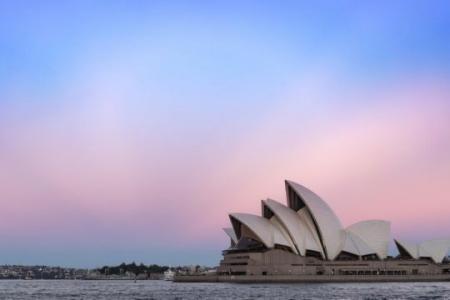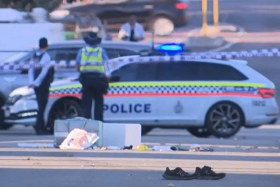7 things about S'pore-Australia Vaccinated Travel Lane
SYDNEY - From Sunday (Nov 21), vaccinated travellers will finally be able to travel freely between Singapore and Australia as Canberra starts to unwind its strict international border closures.
The vaccinated travel lane (VTL) marks Australia's first such arrangement with any country beyond New Zealand.
For a start, only New South Wales (NSW), Victoria and the Australian Capital Territory (ACT) are involved in the VTL.
Other Australian states are likely to join in the coming months and relax their rules as their vaccination rates increase.
What this means for travellers planning interstate trips in Australia is that the journey may not be as straightforward as it seems.
1. Who is eligible to fly to Australia?
Singapore citizens who are fully vaccinated will be able to travel to Australia without quarantining, but only to participating states and territories. Entrants from Singapore must have certification of their vaccination and hold a valid visa. They are allowed to have spent time outside of Singapore before entering Australia.
The eight vaccines currently recognised by Australia are manufactured by AstraZeneca (Vaxzevria and Covishield), Pfizer/BioNTech (Comirnaty), Moderna (Spikevax), Sinovac (CoronaVac), Bharat (Covaxin), Sinopharm (BBIBP-CorV) and Johnson & Johnson (Janssen-Cilag).
Travellers must have received their final vaccine dose at least a week before travelling. Children under the age of 12 do not need to be vaccinated.
2. What to do before flying?
Travellers must take a Covid-19 polymerase chain reaction (PCR) test within three days of departure (unless a medical exemption applies) and must have documentation of a negative result.
Those who are older than 12 years and three months should complete an Australia travel declaration at least 72 hours before departure. This contains a declaration of their vaccination status, and they have to upload their vaccination certificate.
3. What happens at check-in at Changi Airport?
Travellers aged 12 years or older must present their vaccination certificate to the airline staff when checking in. The certificate can be paper or digital. While the certificate can show a shortened brand name, such as BioNTech, those who had the Sinopharm vaccine must be able to show it was Sinopharm's Beijing version.
Travellers, including children aged five and over, must also present proof of an accepted negative Covid-19 test, typically a PCR test, taken at an accredited facility within three days of the departure time. Rapid antigen tests and serology tests are not accepted.
If the flight is delayed, the test will remain valid. But if the flight is cancelled or rescheduled, the test must be within three days of the new departure time.
4. What happens upon arrival in Australia?
The rules for overseas arrivals vary by state. But, at the moment, NSW, Victoria and ACT all require travellers to take a Covid-19 test within 24 hours of arrival.
Travellers to NSW, which includes Sydney, must take a second test on or after day seven.
Travellers to Victoria, which includes Melbourne, must take a second test between day five and seven. Travellers aged 12 and above must also have an international passenger travel permit, which they can obtain from the Service Victoria website or app.
Travellers to the ACT, which includes Canberra, must take a second test on day six.
Travellers in the two states and the ACT may not be able to go to schools and other areas considered at risk until after their second negative test.
Most states and territories also have their own apps, which must be used to check in to shops and other venues.
5. What happens if I want to travel interstate?
It is complicated. States and territories in Australia all have different border and quarantine rules.
If travelling outside NSW, Victoria or the ACT, the best approach is to check the specific rules of the intended destination. Entry to some states may be denied altogether. If permitted, those going interstate - by train, plane or road - may be required to quarantine or hold special passes.
For Western Australia, for instance, international arrivals must have spent 14 days in Australia before entering. But the rules then vary depending on which Australian state the traveller is arriving from.
If coming from NSW, for instance, travellers must take a Covid-19 test before arrival, self-quarantine for 14 days and get a Covid-19 test within 48 hours during self-quarantine and again on day 12. Those coming from Victoria face stricter rules and must spend 14 days in hotel quarantine at their own expense. But the rules for Western Australia will be relaxed when 90 per cent of eligible residents are vaccinated - a target expected to be achieved, at the latest, by early February.
6. You're in Australia. Now what should you do?
In most Australian states and territories, Covid-19 restrictions still apply, but life is quickly returning to normal for the fully vaccinated.
It is a good idea to carry the following three items at all times: a mask, proof of vaccination and a phone that has the relevant check-in app of the state or territory.
In most places, masks are not compulsory outdoors but must be worn in specified indoor venues, sometimes including shops and public transport.
Rules for indoor mask-wearing vary by state. Restaurants, cafes and bars may have limits on their capacity, but guests can remove masks to eat and drink. There is typically no limit on group bookings.
For a list of the different rules in different states and territories, travellers can check this website.
7. Could all of the above change?
Yes. The rules apply to current travel as the Australia-Singapore travel lane opens. For Australia, this is a pilot scheme, which is starting with Singapore citizens and is likely to be expanded to other nationalities and other places of departure.
It is worth checking the latest rules on the Australian government's website as well as the websites of specific states and territories.
Overall, the rules are likely to be relaxed as vaccination rates increase in individual states. As at Friday (Nov 19), vaccination rates ranged from about 72 per cent fully vaccinated in Western Australia, the Northern Territory and Queensland, to 92 per cent in NSW.
Get The New Paper on your phone with the free TNP app. Download from the Apple App Store or Google Play Store now


